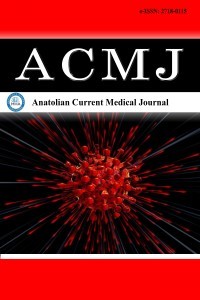
Anatolian Current Medical Journal
Yazarlar: ["Timuçin ŞİPAL", "Melıha TURKSEVER", "Hatice TEZCAN", "Ercan YUVANÇ"]
Konular:-
DOI:10.38053/acmj.1206669
Anahtar Kelimeler:Guillain Barre syndrome,Urosepsis,Ureteral stones,Hydronephrosis
Özet: Guillain Barre syndrome (GBS) is the most common neurological cause of acute flaccid paralysis worldwide. Early diagnosis and treatment of GBS are vital due to possible deadly consequences. Awareness of the silent neurological symptoms in patients preparing for upcoming surgery may have critically crucial for a urologist. Developing GBS after relieving urosepsis is rarely addressed in the literature. Therefore, this report presents an infrequent complication of Escherichia coli (E. coli)-induced urosepsis, GBS. A 47-year-old female patient was admitted to the emergency department in a septic state. During the intensive care unit management with the preliminary diagnosis of sepsis-related hypovolemic shock, a nephrostomy catheter was placed in an obstructed left kidney due to impacted upper ureteral calculus with 1.5 cm in size. Following the improvement of the patient’s condition in intensive care unit with proper management, the patient was transferred to the urology ward for definitive treatment. During the follow-up, however, the patient showed some neurological signs and symptoms considering GBS. An obtained cerebral spinal fluid analysis revealed an albumin-cytologic dissociation and examining the patient underpinned the diagnosis. The patient was treated with intravenous immunoglobulin for five days, according to the guidlines. After the treatment, the patient’s condition improved rapidly following two weeks. The left obstructed ureteral stones were removed with ureteroscopy. A stone-free status was achieved the following month. GBS is the most common cause of acute flaccid paralysis worldwide, and proper management is essential due to poor prognosis. GBS after a uroseptic condition is sporadic, but any surgery on patients who experience active GBS would bode for severe consequences, so awareness of the silent neurological symptoms in patients prepared for upcoming surgery is vital for a urologist. We aimed to remind with this report of the possibility of GBS for a patient who expresses neurological symptoms following a septic state.